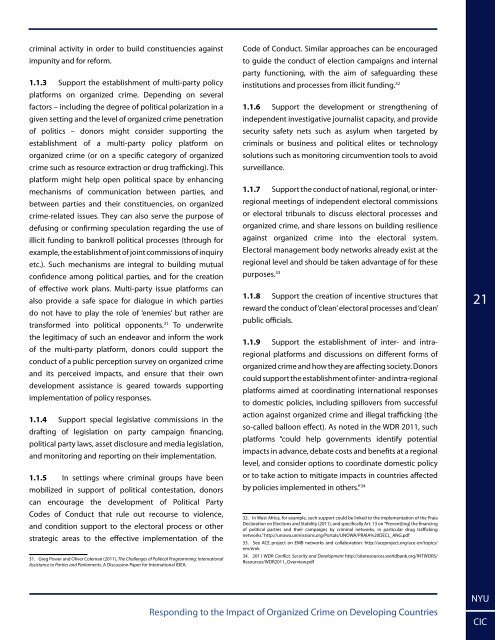here - Center on International Cooperation - New York University
here - Center on International Cooperation - New York University
here - Center on International Cooperation - New York University
Create successful ePaper yourself
Turn your PDF publications into a flip-book with our unique Google optimized e-Paper software.
criminal activity in order to build c<strong>on</strong>stituencies against<br />
impunity and for reform.<br />
1.1.3 Support the establishment of multi-party policy<br />
platforms <strong>on</strong> organized crime. Depending <strong>on</strong> several<br />
factors – including the degree of political polarizati<strong>on</strong> in a<br />
given setting and the level of organized crime penetrati<strong>on</strong><br />
of politics – d<strong>on</strong>ors might c<strong>on</strong>sider supporting the<br />
establishment of a multi-party policy platform <strong>on</strong><br />
organized crime (or <strong>on</strong> a specific category of organized<br />
crime such as resource extracti<strong>on</strong> or drug trafficking). This<br />
platform might help open political space by enhancing<br />
mechanisms of communicati<strong>on</strong> between parties, and<br />
between parties and their c<strong>on</strong>stituencies, <strong>on</strong> organized<br />
crime-related issues. They can also serve the purpose of<br />
defusing or c<strong>on</strong>firming speculati<strong>on</strong> regarding the use of<br />
illicit funding to bankroll political processes (through for<br />
example, the establishment of joint commissi<strong>on</strong>s of inquiry<br />
etc.). Such mechanisms are integral to building mutual<br />
c<strong>on</strong>fidence am<strong>on</strong>g political parties, and for the creati<strong>on</strong><br />
of effective work plans. Multi-party issue platforms can<br />
also provide a safe space for dialogue in which parties<br />
do not have to play the role of ‘enemies’ but rather are<br />
transformed into political opp<strong>on</strong>ents. 31 To underwrite<br />
the legitimacy of such an endeavor and inform the work<br />
of the multi-party platform, d<strong>on</strong>ors could support the<br />
c<strong>on</strong>duct of a public percepti<strong>on</strong> survey <strong>on</strong> organized crime<br />
and its perceived impacts, and ensure that their own<br />
development assistance is geared towards supporting<br />
implementati<strong>on</strong> of policy resp<strong>on</strong>ses.<br />
1.1.4 Support special legislative commissi<strong>on</strong>s in the<br />
drafting of legislati<strong>on</strong> <strong>on</strong> party campaign financing,<br />
political party laws, asset disclosure and media legislati<strong>on</strong>,<br />
and m<strong>on</strong>itoring and reporting <strong>on</strong> their implementati<strong>on</strong>.<br />
1.1.5 In settings w<str<strong>on</strong>g>here</str<strong>on</strong>g> criminal groups have been<br />
mobilized in support of political c<strong>on</strong>testati<strong>on</strong>, d<strong>on</strong>ors<br />
can encourage the development of Political Party<br />
Codes of C<strong>on</strong>duct that rule out recourse to violence,<br />
and c<strong>on</strong>diti<strong>on</strong> support to the electoral process or other<br />
strategic areas to the effective implementati<strong>on</strong> of the<br />
31. Greg Power and Oliver Coleman (2011), The Challenges of Political Programming: Internati<strong>on</strong>al<br />
Assistance to Parties and Parliaments, A Discussi<strong>on</strong> Paper for Internati<strong>on</strong>al IDEA.<br />
Code of C<strong>on</strong>duct. Similar approaches can be encouraged<br />
to guide the c<strong>on</strong>duct of electi<strong>on</strong> campaigns and internal<br />
party functi<strong>on</strong>ing, with the aim of safeguarding these<br />
instituti<strong>on</strong>s and processes from illicit funding. 32<br />
1.1.6 Support the development or strengthening of<br />
independent investigative journalist capacity, and provide<br />
security safety nets such as asylum when targeted by<br />
criminals or business and political elites or technology<br />
soluti<strong>on</strong>s such as m<strong>on</strong>itoring circumventi<strong>on</strong> tools to avoid<br />
surveillance.<br />
1.1.7 Support the c<strong>on</strong>duct of nati<strong>on</strong>al, regi<strong>on</strong>al, or interregi<strong>on</strong>al<br />
meetings of independent electoral commissi<strong>on</strong>s<br />
or electoral tribunals to discuss electoral processes and<br />
organized crime, and share less<strong>on</strong>s <strong>on</strong> building resilience<br />
against organized crime into the electoral system.<br />
Electoral management body networks already exist at the<br />
regi<strong>on</strong>al level and should be taken advantage of for these<br />
purposes. 33<br />
1.1.8 Support the creati<strong>on</strong> of incentive structures that<br />
reward the c<strong>on</strong>duct of ‘clean’ electoral processes and ‘clean’<br />
public officials.<br />
1.1.9 Support the establishment of inter- and intraregi<strong>on</strong>al<br />
platforms and discussi<strong>on</strong>s <strong>on</strong> different forms of<br />
organized crime and how they are affecting society. D<strong>on</strong>ors<br />
could support the establishment of inter- and intra-regi<strong>on</strong>al<br />
platforms aimed at coordinating internati<strong>on</strong>al resp<strong>on</strong>ses<br />
to domestic policies, including spillovers from successful<br />
acti<strong>on</strong> against organized crime and illegal trafficking (the<br />
so-called ballo<strong>on</strong> effect). As noted in the WDR 2011, such<br />
platforms “could help governments identify potential<br />
impacts in advance, debate costs and benefits at a regi<strong>on</strong>al<br />
level, and c<strong>on</strong>sider opti<strong>on</strong>s to coordinate domestic policy<br />
or to take acti<strong>on</strong> to mitigate impacts in countries affected<br />
by policies implemented in others.” 34<br />
32. In West Africa, for example, such support could be linked to the implementati<strong>on</strong> of the Praia<br />
Declarati<strong>on</strong> <strong>on</strong> Electi<strong>on</strong>s and Stability (2011), and specifically Art. 13 <strong>on</strong> “Prevent[ing] the financing<br />
of political parties and their campaigns by criminal networks, in particular drug trafficking<br />
networks.” http://unowa.unmissi<strong>on</strong>s.org/Portals/UNOWA/PRAIA%20DECL_ANG.pdf<br />
33. See ACE project <strong>on</strong> EMB networks and collaborati<strong>on</strong>: http://aceproject.org/ace-en/topics/<br />
em/emk<br />
34. 2011 WDR C<strong>on</strong>flict, Security and Development http://siteresources.worldbank.org/INTWDRS/<br />
Resources/WDR2011_Overview.pdf<br />
21<br />
Resp<strong>on</strong>ding to the Impact of Organized Crime <strong>on</strong> Developing Countries<br />
NYU<br />
CIC
















